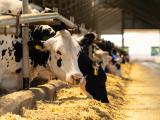Jul 15 (CIDRAP NEWS) The United Nations' food standards body announced last week that it would allow higher kiloGray (kGy) doses for irradiating food. The Codex Alimentarius Commission, the highest international body on food standards, will now allow irradiation doses greater than 10 kGy when "necessary to achieve a legitimate technological purpose." The new standard also states, "The minimum absorbed dose should be sufficient to achieve the technological purpose, and the maximum absorbed dose should be less than that which would compromise consumer safety, wholesomeness or would adversely affect structural integrity, functional properties, or sensory attributes." The new standard is detailed in the Revised Codex General Standard for Irradiated Foods, adopted at the commission's 26th session last week in Rome. The previous standard was approved by the body in 1983.
A press release on the meeting states that allowing higher irradiation doses would eliminate some bacterial spores that cannot be killed at doses of 10 kGy or less. Alan Randell, the Codex Alimentarius Commission secretary, told CIDRAP News he believes the higher dose level will apply mainly to dry foodstuffs, such as spices. Foods with a high moisture or high fat content tend to have an off taste when irradiated at greater than 10kGy, according to Randell. He added that food manufacturers who use spices in prepared meals and sausages may benefit the most from the revised standard, because they will now be able to irradiate at a higher dose.
Higher doses of irradiation would also mean that previously radiation-resistant pathogens, including Clostridium botulinum, could be eliminated, according to the press release.
"This is a really important breakthrough," Randell says in the press release. "For the consumer it means a potential for higher levels of food safety because of the protection offered by food irradiation. For example, it can be applied to spices which can carry bacteria resistant to other treatments."
The commission meeting was attended by 124 of the 169 member countries, the most ever to attend. Randell said the language and details of the revised irradiation standard were discussed and decided by the Committee on Food Additives and Contaminants prior to last week's full Codex Alimentarius Commission meeting. The committee made its recommendations to the commission, which then adopted the revised standard. Ten countriesAustria, Denmark, Germany, Greece, Hungary, Italy, Mexico, Poland, Spain, and Sudandid not support the change.
According to Randell there has been little opposition from outside groups since the announcement was made of the new food irradiation standard.
On the issue of radioactivity, Secretary Randell is quoted in the press release as saying, "Irradiated foods are proven safe and do not contain any radioactive traces." Numerous medical and scientific organizations including the American Council on Science and Health, the American Medial Association, the Council for Agricultural Science and Technology, the International Atomic Energy Agency, and the Scientific Committee of the European Union agree that irradiated foods are not radioactive.
Irradiation has been shown to kill at least 99.9% of certain harmful bacteria, including Escherichia coli O157:H7 and Salmonella. Even with the higher doses of irradiation, the Codex Alimentarius Commission states that irradiation "should not be used as a substitute for good hygienic and good manufacturing practices or good agricultural practices."
The Codex Alimentarius Commission is a subsidiary body of the Food and Agriculture Organization of the United Nations (FAO) and the World Health Organization (WHO). Codex Alimentarius means "food code" and is the compilation of all the standards, codes of practice, guidelines, and recommendations of the commission. The irradiation standard was adopted among a group of 50 new or revised food standards addressing how to assess the risks to consumers from food derived from biotechnology.
See also:
FAO/WHO July 9 press release
http://www.fao.org/english/newsroom/news/2003/20363-en.html
Revised Codex General Standard for Irradiated Foods
ftp://ftp.fao.org/codex/standard/en/CXS_106e_1.pdf
Codex Alimentarius Commission
www.codexalimentarius.net
















